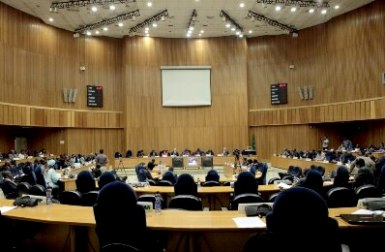AUPSC urges full implementation of South Sudan’s peace agreement
September 29, 2015 (NEW YORK) – African Union Peace and Security Council (AUPSC) in its 547th meeting in New York at the level of heads of state and government has commended the warring parties in South Sudan for signing the peace agreement to end the 21-month long civil war and urged them to fully implement it.

“Welcomes the? signing of the Agreement on the Resolution of the Conflict in the Republic of South Sudan (hereafter the Agreement) by Dr. Riek Machar Teny Dhurgon, Chairman of the Sudan People’s Liberation Movement In Opposition (SPLM/IO), Mr. Pagan Amum, on behalf of the Former Political Detainees (FD) and by other South Sudanese stakeholders, during the IGAD-Plus Summit held in Addis Ababa, on 17 August 2015, as well as by President Salva Kiir Mayardit, in Juba, on 26 August 2015;” party reads the communique from New York.
It stressed that the signing of the agreement represents a decisive step in the efforts aimed at ending the conflict that broke out in December 2013 and the untold violence inflicted on the civilian population. The document further reiterated? the? African Union’s (AU) full support to the peace agreement noting that it is the result of intensive and prolonged negotiations and consultations, and that? the provisions contained therein should be implemented in their “entirety and unequivocally.”
The AU Peace and Security Council however said it noted with deep disappointment and concern that following the signing of the peace deal, there have been reports of violations of the permanent ceasefire and warned to impose sanctions with measures targeting individuals who will be spoiling the implementation of the deal.
“Council strongly warns all concerned that it will not tolerate any further violations and, in line with its previous pronouncements, expresses its determination to impose measures against all those who would impede the implementation process of this Agreement,” it reads.
It also called for urgent transition of the IGAD Monitoring and Verification Mechanism (MVM) into the Ceasefire and Transitional Security Arrangements Monitoring Mechanism (CTSAMM), as provided for in the agreement and to operationalize it, as a means of verifying compliance with the agreement and addressing claims and counter-claims regarding violations of the ceasefire.
The document welcomed the convening of military workshop in the Ethiopian capital, Addis Ababa, by the warring parties and urged them to agree on the ceasefire implementation as well as the security arrangements in accordance with the provisions in the peace deal.
AUPSC also requested the chairperson of the African Union’s commission to release the report on atrocities committed in South Sudan since 15 December 2013 as documented by the AU’s commission of inquiry and to terminate the mandate of the inquiry commission.
It also urged for establishment of an independent hybrid court in South Sudan to try individuals accused of committing the atrocities.
The communique also reaffirmed the AU’s commitment to a comprehensive approach to the issues of justice and reconciliation in accordance with the peace agreement signed by the parties in the youngest nation.
“Reiterates its conviction that? the achievement of lasting peace and reconciliation in South Sudan requires a holistic approach addressing, in a mutually-supportive way, the inter-related issues of accountability, reconciliation, healing and institutional reforms, based on ownership by the South Sudanese stakeholders and robust African and international support,” it says.
“Notes the? findings and recommendations contained in the Final Report of the AUCISS and the Separate Opinion, as they relate to institutional reforms in South Sudan (building a strong state, systems of governance, devolution of power, comprehensive security sector reform, financial management and strategic resources, national and state legislative, judiciary and justice delivery system, political parties, civil society and media) and human rights violations and other abuses during the conflict, including accountability (violation of human rights and other abuses, healing and reconciliation and sequencing of peace and security).”
The Council also declared the decade from 2014 to 2024 as a decade of peace in Africa in memory of Madibe Nelson Mandela, former South African president and renowned peace maker.
(ST)
